There is a growing consensus among social scientists, journalists and other people who study America's overdose crisis for a living that one of the overarching reasons driving it is the fact that Americans are feeling increasingly lonely and alienated. A 2019 poll of American adults, for instance, found that more than one in five reported they had no friends at all.
This loneliness is also being fueled by declining religious involvement, falling marriage rates and a growing "gig" economy that renders obsolete such longstanding notions as a stable workplace and a set of coworkers. And then there is America's obsession with what one journalist has called "radical individualism," especially among men, who are taught early on that seeking help is a sign of weakness.
So if radical individualism helps drive the overdose crisis, then what FitzGerald and Pastor Pam are practicing might hold the key to reversing it.
Call it radical compassion — going out of your way to save the lives of total strangers.
Such an impulse comes naturally to FitzGerald, a familiar figure for decades in union halls, picket lines, pro-union rallies in Jefferson City and various protest marches.
In his Ballwin home, by the door to the garage, there is a framed photo of FitzGerald on his BMW motorcycle, leading a march in downtown St. Louis against Missouri Republicans' efforts to pass a union-busting right-to-work law.
Fitzgerald laughs as he shows another picture of himself dressed up as a Tyrannosaurus rex and balanced perilously atop a giant crane looming over the St. Louis skyline to protest an earlier effort to pass right-to-work.
"I was so lucky I didn't get arrested that day," he says.
Like so many people who've devoted their lives to helping others, FitzGerald has experienced more than his share of tragedy and suffering.
Two decades ago, FitzGerald's wife Moni, suffering from depression, took her own life. And today FitzGerald continues to worry about a person very close to him — a person with a history of mental illness and drug abuse but whose identity he wishes to keep private — who disappears from his life for long stretches of time.
When you spend a big part of your waking life trying to make the world a better place, then you know going into it that you will enjoy some occasional wins, but also a hell of a lot of disappointment. That's just baked into the pie.
For instance, FitzGerald lights up like a kid at Christmas when he recounts the long fight to pass Medicaid expansion in Missouri. After repeated efforts, Missouri voters finally approved it a year ago, but obstinate Republican lawmakers delayed its implementation until October of this year.
"But we did it," FitzGerald says. "We got it passed."
But FitzGerald concedes that much of his activism has ended up in defeat as conservative Republicans tighten their grip on state government.
"It does get depressing sometimes," he admits.
America was literally founded on the evolving idea that all people had a right to "the pursuit of happiness." In an irony for the ages, America circa 2021 is jam-packed with unhappy, lonely, disappointed, stressed-out, resentful and alienated people.
The COVID-19 pandemic, with its seemingly unending toll of death, serious illness, and economic and social disruptions, has made it worse in many ways. But for years, the United States has seen the same factors that experts have long cited as contributors to dangerous addiction in individuals play out across society at large in increasingly public ways.
Witness the January 6 insurrection at the Capitol, screaming matches at school-board meetings over facemasks and the attraction many millions of Americans harbor toward right-wing authoritarianism and conspiracy cults like QAnon.
The event has already vanished from headlines, but it still bears repeating that hundreds of QAnon true believers gathered in Dallas on November 22 for the prophesized return from the dead of President John F. Kennedy and his son JFK Jr.
It may have been a pursuit, but it did not end in happiness.
In a recent article for the online journal The Week titled "Why are Americans Drugging Themselves to Death," the journalist Damon Linker notes a 2015 study that found 32 million Americans, or one in seven adults, dealt with a serious alcohol problem the previous year, while nearly one-third of Americans would show signs of a serious alcohol-use disorder at some point in their lives.
Linker also points out that America leads the world in per-capita consumption of prescription medications for anxiety and depression, with 13 percent of adults relying on them even before the pandemic caused new spikes.
Linker writes that America is experiencing a "spiritual crisis" because "it seems to involve such comprehensive issues, many of them wrapped up with existential questions of elemental happiness. Our country's civil religion tells us America is the greatest nation in the world because we're left free to pursue happiness however we wish. But who among us really knows how to be happy?"
Whatever the cause, Linker concludes, "Americans appear to be losing their way in the world, anxiously pursuing a happiness that eludes them, and ending up drawn to toxic chemical and ideological substitutes for relief from the misery of a disconnected, purposeless existence. ... Which might just be another way of saying that radical individualism is hard — and quite possibly a burden too heavy for many of us to bear."
Linker paints a bleak portrait of today's America — one that is, well, beyond argument to anyone who's been paying attention. America's fraught political debates are as hard to ignore as a car alarm blaring late at night.
Democrats fuss and fret that democracy is on a death watch because the Republican Party is now an authoritarian personality cult determined to kill it. They fear the January 6 organizers will escape justice.
Meanwhile, Republican leaders claim the 2020 election was stolen and that they're going to make sure it won't happen again. And once-innocuous things like facemasks and stupid phrases like "Let's go, Brandon" are suddenly political flashpoints and fierce markers of tribal identity.
But there is hope, always hope.
And you feel it when you hang out with FitzGerald and Pastor Pam.
They've driven to a small north-county food market/liquor store a few miles from the QuikTrip. The market is rumored to be a place where substance users come to buy and use drugs.
The pair take up positions near the market's entrance. Late afternoon has given way to dusk, and then to nightfall. They've given away almost all their Narcan boxes.
Then a young man named Greg approaches them. He asks for their last Narcan box.
Greg says his father got hooked on opioids because of a legal prescription.
"He took them for the pain," Greg says. "Now he's abusing them. There are times he might OD."
FitzGerald gives him the Narcan and grins, looking pleased as Greg disappears into the night.
Pastor Pam shares the look. The world isn't going to change if a stranger named Greg can save his dad's life, but it's something.
"So if we can keep doing that, one by one," FitzGerald says, "it's a ripple effect. And it can get bigger and bigger."
Mike Fitzgerald is a freelance journalist. You can follow him on Twitter at @MikeWearAMask.







